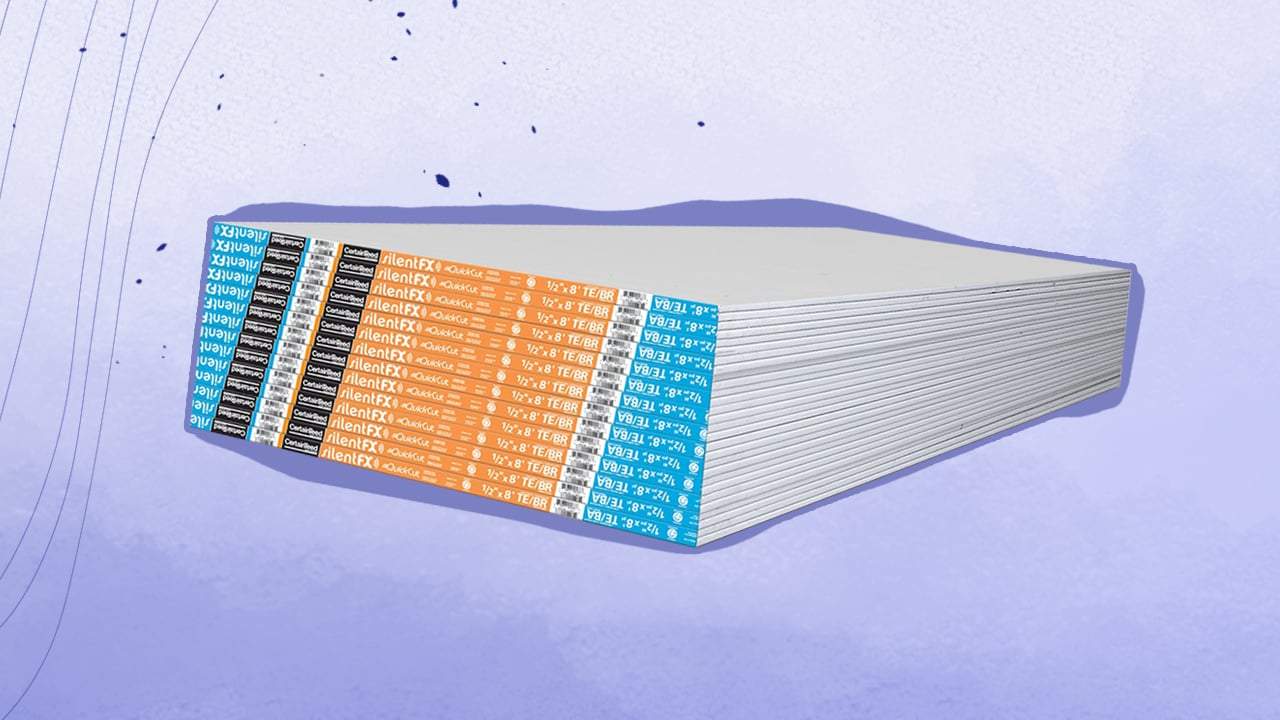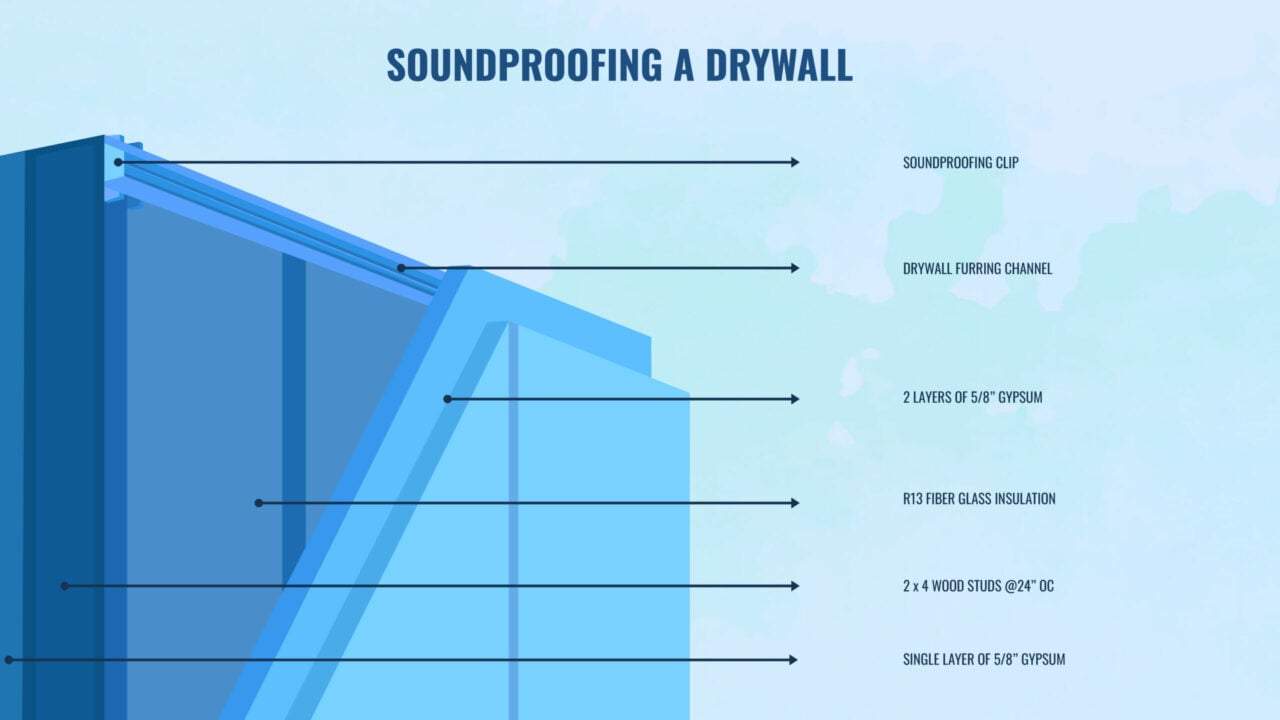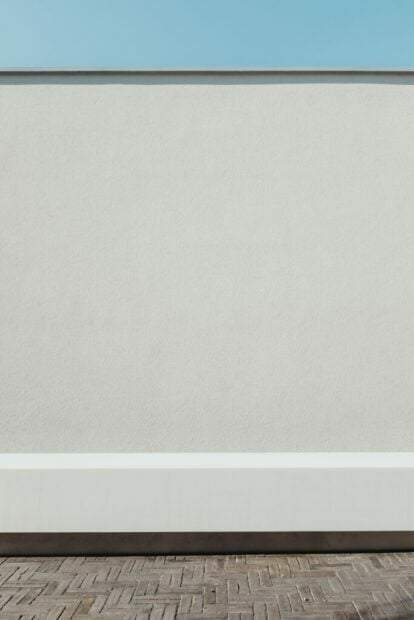Soundproofing drywall is by far the most effective method to reduce noise in any space. If you want to find the ideal drywall for soundproofing, PABCO’s QuietRock, CertainTeed’s SilentFX, and National Gypsum’s SoundBreak provide some of the best products on the market.
If you’re setting up your new house or will construct a new room inside your home, you need to consider building a good soundproofing foundation right from the get-go.
Installing drywall for soundproofing might just be the solution you need to reduce sound transmission effectively!
In this article, we list the five best soundproofing drywall products that can help you make an informed decision.
The 5 Best Soundproof Drywall Picks
When it comes to soundproofing walls or ceilings, many turn to drywall. In this list, we round up the five best drywall for soundproofing available on the market:
1. QuietRock 530 – Best Overall

What I Liked
- High STC score
- Space-saver
- Cost-effective
What I Didn’t Like
- Expensive
- Not recommended for ceilings
Introduced by PABCO in 2003, QuietRock drywall is the first sound-dampening drywall to hit the market.
PABCO’s QuietRock drywall products are built with a three-layer design, which consists of a layer of viscoelastic polymer in between two layers of 1/4″ thick gypsum drywall.
The viscoelastic polymer in the middle layer is a specialized material that disperses sound better than other synthetic polymers.
This design gives QuietRock drywall panels better soundproofing compared to traditional drywall.
QuietRock 530 is their high-performance gypsum board that provides superior noise reduction. It’s a dense panel with added shear, impact, and fire resistance.
QuietRock 530 is the middle ground for QuietRock drywall products, with a Sound Transmission Class (STC) rating of 52 up to 74 but feel free to consult the table below for other QuietRock soundproofing drywall options, all of them being tried and tested by the market, coming on top of acoustic experts time and time again.
| Quietrock Panels | Thickness | Width | Length | Weight | Core | STC* |
|---|---|---|---|---|---|---|
| EZ Snap | ⅝” | 48” | 8’,9’,10’ | 2.6 lbs/ft2 | QRES/Type X | 48-60 |
| EZ Snap Mold Resistant | ⅝” | 48” | 8’,9’,10’ | 2.6 lbs/ft2 | QRES/Type X | 48-60 |
| QuietRock 510 | 1/2” | 48” | 8’,9’,10’12’ | 2.13 lbs/ft2 | QR510/Regular | 47-69 |
| QuietRock 530 | ⅝” | 48” | 8’,9’,10’12’ | 2.88 lbs/ft2 | QR530/Type X | 52-74 |
| QuietRock 530RF | ⅝” | 48” | 8’,9’,10’12’ | 2.88 lbs/ft2 | QR530/ Type X | 52-74 |
| QuietRock 545 | 1 ⅜” | 48” | 8’ | 6.25 lbs/ft2 | QR545/Regular | 60-80 |
| *STC: The variation is influenced by the frame material type (wood or steel). Wood frames perform better acoustically and thus produce higher STC scores. | ||||||
Core: Type X Core | Thickness: 5/8″ (15.9 mm) | Width: 48″ (1219 mm) | Weight: 2.88lbs/ft2
2. SilentFX QuickCut- Best All-Rounder

What I Liked
- Easy to install
- Great for reducing airborne noise
What I Didn’t Like
- Mid-range STC score
- Limited product options
Perhaps the closest competitor to PABCO’s QuietRock is CertainTeed’s SilentFX QuickCut.
SilentFX QuickCut is a versatile drywall or sheet rock made of dense gypsum wallboard with a viscoelastic polymer.
What’s great about SilentFX QuickCut is that it can be used for various applications, whether for residential, commercial, or institutional purposes.
SilentFX is specifically designed to be easy and fast to install, allowing for lower labor costs overall.
It can be applied to new or existing drywall over wood or steel frames.
CertainTeed also added their moisture and mold-resistant M2Tech to this product for better indoor air quality and prevention of mold growth.
Similar to QuietRock, it’s a Type X drywall with a 1-hour fire rating.
Although SilentFX is an all-around product that works for many applications, it only has a maximum STC rating of 56.
| CertainTeed Panels | Thickness | Width | Length | Weight | STC* | |
|---|---|---|---|---|---|---|
| SilentFX Quickcut | ½” | 48” | 8’,9’,10’12’ | 2.1 lbs/ft2 | 41-54 | |
| SilentFX Quickcut Type X | ⅝” | 48” | 8’,9’,10’12’ | 2.8 lbs/ft2 | 40-64 | |
| *STC: The variation is influenced by the frame material type (wood or steel). Wood frames perform better acoustically and thus produce higher STC scores. | ||||||
Core: Type X Core | Thickness: 5/8″ (15.9 mm) | Width: 4″ (1220 mm) | Length: comes in 8′ (2438 mm), 9′ (2743 mm), 10′ (3048 mm), 12′ (3658 mm) | Weight: 2.1 lbs/ft2
3. SoundBreak XP Wall Board – Best Budget Pick

What I Liked
- Visually striking
- High-build quality
- Cost-effective
- Sturdy pocket clip
What I Didn’t Like
- Cannot be applied to existing drywall
- Not recommended for ceilings
National Gypsum is steadily becoming a popular choice for many due to its wide range of soundproofing options at an affordable price.
You can probably identify them through their signature PURPLE paper, which is 100% recycled.
National Gypsum’s SoundBreak is their family of soundproof acoustic panels that come in various thicknesses and STC ratings for walls and ceilings.
Their SoundBreak XP Wall Boards come in two types: 1/2″ and 5/8″ thickness.
According to National Gypsum, the 5/8″ SoundBreak XP Wall Board can also be used in place of Type X drywall.
They also came out with SoundBreak XP Retrofit, which can be applied to existing sheetrock for improved acoustics.
With its high-density gypsum core, SoundBreak XP Wall Board offers superb sound dampening with a Sound Transmission Class score of 43 to 63.
The Soundbreak XP Wall Board is moisture, mildew, and mold resistant, thanks to their Sporgard Technology.
| National Gypsum Panels | Thickness | Width | Length | Weight | STC* |
|---|---|---|---|---|---|
| SoundBreak XP Wall Board | ½” | 48” | 8’,10’ | N/A | 39-51 |
| SoundBreak XP Wall Board | ⅝” | 48” | 8’,10’ | N/A | 43-63 |
| SoundBreak XP Ceiling Board | ¾” | 48” | 8’,10’ | N/A | 59-60 |
| SoundBreak XP Retrofit Board | 5/16” | 48” | 8’,10’ | N/A | 36-53+ |
| *STC: The variation is influenced by the frame material type (wood or steel). Wood frames perform better acoustically and thus produce higher STC scores. | |||||
Core: Type X Core | Thickness: 1/2″ (12.7 mm), 5/8’’ (15.9 mm) | Width: 48″ (1219.2 mm) | Length: comes in 8′ (2438 mm), 9′ (2743 mm), 10′ (3048 mm) | Weight: N/A
4. QuietRock EZ-SNAP – Best Value

What I Liked
- Easy installation
- High STC rating
- Ideal for people with little construction experience
What I Didn’t Like
- Not shear, impact, or mold-resistant
- Comparatively pricier than other soundproof sheetrock
QuietRock EZ-SNAP is one of PABCO’S lowest-costing soundproof sheetrock to date.
It’s designed with a special paper that can be easily scored and snapped, just like standard gypsum drywall sheets.
This is ideal for those who have little experience in construction or renovation.
With QuietRock’s thin wall technology, it also doesn’t take up much space to be installed. It means you can save on labor, time, and floor space with this product.
QuietRock EZ-SNAP also boasts an outstanding STC rating of up to 60 with a fire rating of 1 hour.
It delivers excellent acoustic performance that can exceed even multiple layers of traditional drywall or resilient channels.
You get your money’s worth with EZ-SNAP’s packed features and quick installation.
| Quietrock Panels | Thickness | Width | Length | Weight | Core | STC* |
|---|---|---|---|---|---|---|
| EZ Snap | ⅝” | 48” | 8’,9’,10’ | 2.6 lbs/ft2 | QRES/Type X | 48-60 |
| EZ Snap Mold Resistant | ⅝” | 48” | 8’,9’,10’ | 2.6 lbs/ft2 | QRES/Type X | 48-60 |
| QuietRock 510 | 1/2” | 48” | 8’,9’,10’12’ | 2.13 lbs/ft2 | QR510/Regular | 47-69 |
| QuietRock 530 | ⅝” | 48” | 8’,9’,10’12’ | 2.88 lbs/ft2 | QR530/Type X | 52-74 |
| QuietRock 530RF | ⅝” | 48” | 8’,9’,10’12’ | 2.88 lbs/ft2 | QR530/ Type X | 52-74 |
| QuietRock 545 | 1 ⅜” | 48” | 8’ | 6.25 lbs/ft2 | QR545/Regular | 60-80 |
| *STC: The variation is influenced by the frame material type (wood or steel). Wood frames perform better acoustically and thus produce higher STC scores. | ||||||
Core: Type X Core | Thickness: 5/8″ (15.9 mm) | Width: 48″ (1219.2 mm) | Length: comes in 8′ (2438 mm), 9′ (2743 mm), 10′ (3048 mm) | Weight: N/A
5. Multiple Layers of Drywall – Best Alternative

(Image Source)
What I Liked
- Budget-friendly
- Versatile
What I Didn’t Like
- Numerous structural problems
- Requires additional soundproof materials
For some people, getting soundproofing sheetrock may be out of their financial capacity.
Another alternative is to use several layers of regular drywall.
With this method, you can apply Green Glue between double layers of sheetrock to prevent noise from traveling to the next room.
Installing more than one layer of standard sheetrock can provide adequate sound insulation; however, this method comes with numerous issues that can do more harm than good, like:
- Fiberglass
- Viscoelastic polymer
- Rubber compound
- Mass loaded vinyl (MLV)
Soundproof Drywall Buying Guide: Factors to Consider

Soundproof drywall can do wonders for reducing sound transmission, but it may not be a solution for everyone.
Before deciding whether to get soundproof or standard drywall, consider the following:
1. Acoustic Performance
Determine WHY you actually need to soundproof your property.
Perhaps you want a soundproof room where you can practice making music without disturbing anyone.
Maybe you want to block out street noise or your neighbors’ rowdy conversations.
Whatever the case, knowing what noise control you want to achieve will help you determine what soundproofing solution will work best for you.
Different soundproof drywall products have different properties that block various decibels and frequencies of noise.
Compare reviews on different soundproofing drywall panels to assess their acoustic performance.
You might not even need drywall panels, but instead need standard acoustic foam soundproof panels, which can be more affordable.
2. Value for Money
Soundproof drywall is an INVESTMENT.
Due to the increased noise control, it can come at a higher price point than your standard drywall.
The soundproof drywall cost can be up to $40 per sheet compared to standard drywall, which costs $10 on average.
If you’re on a budget but still want noise-reducing drywall features, you can choose to limit soundproofing in rooms where noise is a concern.
You don’t have to soundproof your entire house. Reserve soundproof sheetrock for your home office or bedroom.

3. Installation Process
The installation process of your construction or renovation project is a crucial consideration if you’re thinking of including soundproof drywall.
Most soundproof drywall manufacturers offer easy installation options, but some products require professional installation.
You’ll need to account for labor costs, lead time, and the entirety of the installation timeline.
Adding additional layers of standard drywall actually takes MORE time than installing soundproofing drywall.
A single-layer installation of soundproof drywall also cuts back on labor costs compared to installing multiple layers of regular drywall.
We recommend going for soundproof drywall panels whenever possible. They’re cost-effective and don’t require a complex installation process.
4. Durability
Another factor you need to look into is how sturdy your drywall will be.
A sound-dampening drywall will cost you more than a traditional one, so you’d want it to last for several years!
Using multiple drywall layers can give your wall enough added thickness to withstand damage.
5. Location
WHERE you want to apply soundproofing in your house can also help you choose which drywall to use.
If you’re going to put soundproofing materials on the same level as other rooms, you’d want thick sheetrock for better soundproofing.
Alternatively, if you plan to install drywall in the basement, the floor space provides another barrier to sound.

Frequently Asked Questions
Here are some related questions about soundproofing drywall that can help you:
How Does Drywall Reduce Sound Transfer?
Soundproofing uses barriers like drywall that absorb and dampen sound waves to reduce sound transfer from one room to another.
It’s intended to specifically BLOCK impact or airborne sound. There are many ways to use drywall to soundproof a space:
Absorption
Sound-absorbing materials are applied between the inner layer of drywall to
deaden sound vibrations.
There are several materials that can be used to absorb sound, such as:
Fiberglass
Viscoelastic polymer
Rubber compound
Mass loaded vinyl (MLV)
Dampening
Drywall can also be used as dampening panels that cancel out sound waves.
Using a dampening compound between two layers of drywall can help reduce noise.
Applying Green Glue compound provides an additional layer that can increase your STC score by at least ten points.
Green Glue is a viscoelastic compound that disperses sound waves when applied in between layers of plaster.
Decoupling
Sound waves require a medium to pass through in order to be heard.
Decoupling aims to disrupt this process by separating wall attachments from the studs to interrupt the pathway of sound vibration.
You can build a staggered stud wall that effectively decouples the connections that allow sound energy to pass through.
Mass
Adding mass to your drywall is another way to block sound.
For sound to transmit, it needs to make a medium vibrate. Providing greater mass density using a dense layer of drywall means greater resistance against sound vibration.
A double layer of 5/8″ drywall is one of the most effective alternatives for soundproofing.
What’s the Difference Between Soundproofing and Sound Absorption?
Soundproofing primarily intends to block sound from leaving a space.
Sound absorption uses materials that soak up extra sound energy that causes bad acoustics. It doesn’t necessarily stop noise from traveling, but it can improve sound quality.
Both processes often work TOGETHER to achieve the desired level of sound control and reverberation reduction.
How Good Is a Drywall for Soundproofing?
Soundproofing drywall does NOT guarantee complete silence, but it is the most effective solution to noise problems.
Soundproof drywall consists of materials like calcium sulfate dihydrate (gypsum), viscoelastic, and ceramics that make it difficult to transmit sound waves.
If installed correctly, it can make a HUGE impact on your living or workspace.
Conclusion
There are many ways to achieve good soundproofing, such as placing fiberglass insulation, installing sound-absorbing materials on an entire wall, or strategically utilizing air gaps in between walls.
Soundproofing drywall is arguably the most cost-effective method to block unwanted noises.
In this list, we covered the best products on the market that can give your space better acoustics.BUT REMEMBER, the best drywall for soundproofing will depend on your preferences, financial capacity, and the needs of your project. Good luck!

